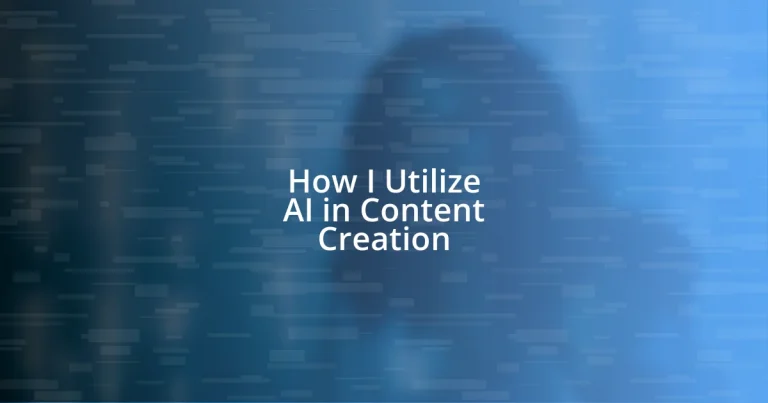Key takeaways:
- AI enhances content creation by boosting efficiency, providing real-time feedback, and supporting idea generation while preserving the creator’s authentic voice.
- Utilizing various AI tools allows for improved writing quality, consistency, and tailoring of content to audience preferences based on data-driven insights.
- The future of AI in content creation holds the potential for personalized user experiences, but it also raises ethical questions about maintaining the human touch in storytelling.
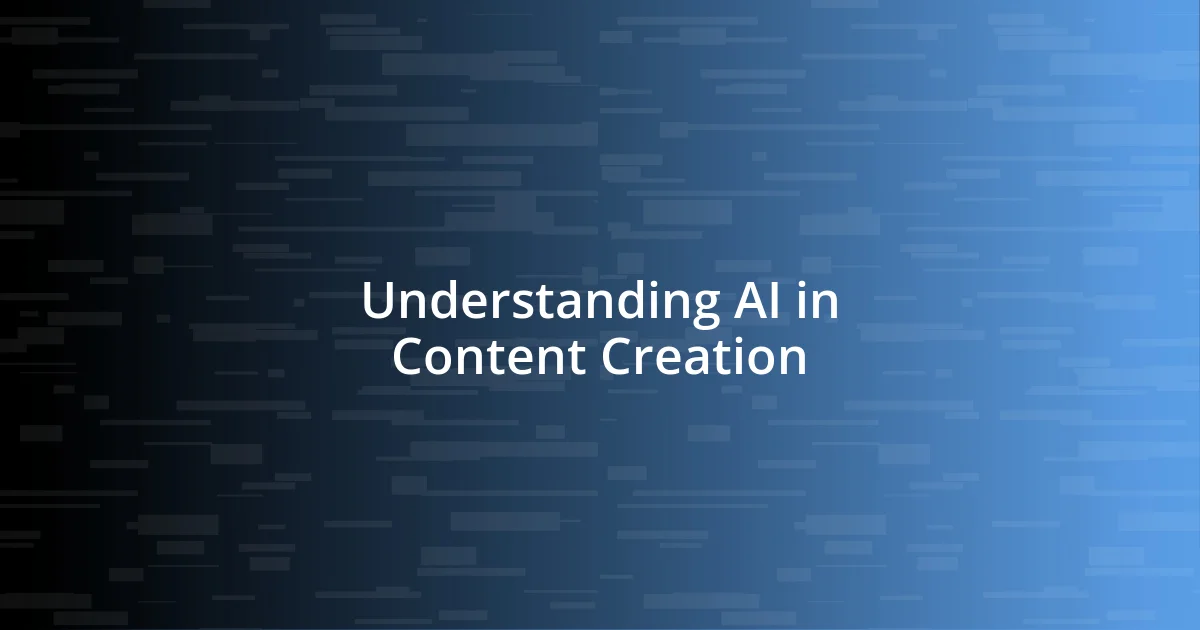
Understanding AI in Content Creation
AI is revolutionizing the way we approach content creation by enhancing both efficiency and creativity. I remember the first time I used an AI-driven tool to generate blog ideas; it was like having a conversation with a brainstorming buddy who never ran out of suggestions. It made me realize that I could explore perspectives I hadn’t considered before.
When we think about innovation, how often do we stop to appreciate the tools that help push our boundaries? For me, AI tools are more than just software; they’re like having a virtual assistant who understands my voice and audience. This synergy between human creativity and AI technology allows us to create more engaging and relevant content—something that resonates deeply with readers.
Using AI in content creation isn’t just about speeding up the process; it’s about enhancing the overall quality of what we produce. I’ve found that by harnessing AI for initial drafts or data analysis, I can inject my personal touch into the final piece more effectively. Navigating this landscape makes me question: how can we best leverage AI without losing our authentic voice in the content? It’s an evolving conversation that I’m excited to be a part of.
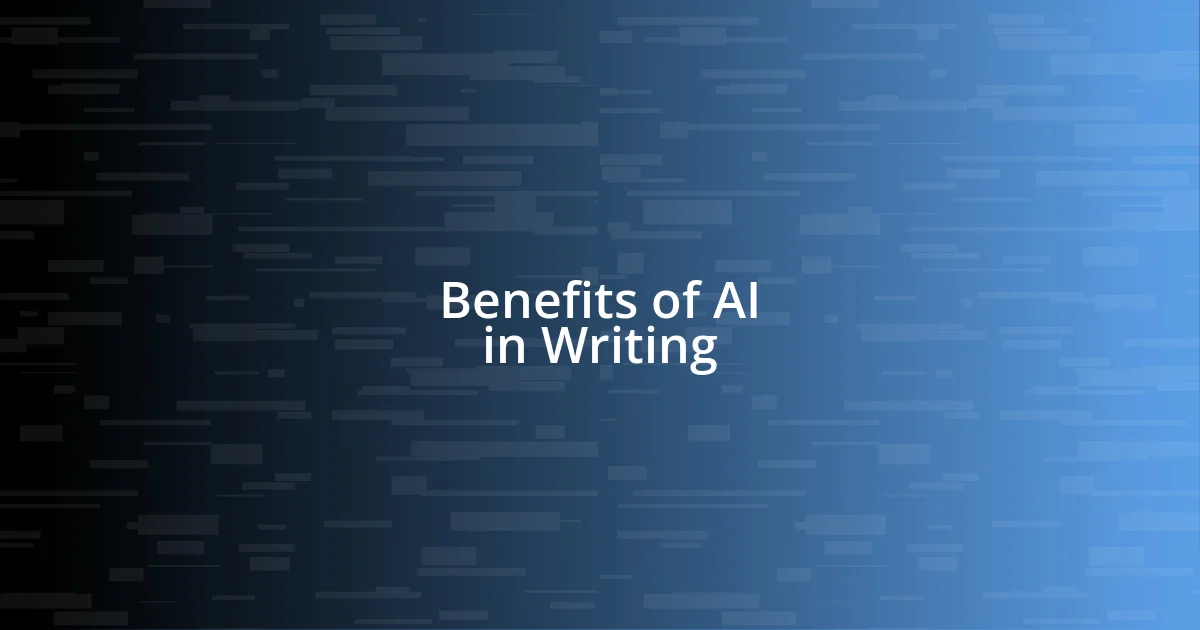
Benefits of AI in Writing
AI offers a multitude of benefits in writing, making it an invaluable ally for any content creator. I once used an AI tool to refine my writing style, and it felt astonishing to receive instant feedback on clarity and tone. It was like having a mentor who never judged, only guided. This experience highlighted how AI can elevate our writing by providing real-time suggestions that enhance not just the technical aspects, but also the emotional resonance of our words.
Here are some notable benefits of integrating AI in writing:
- Speed: I can generate outlines and even complete drafts much faster than before, freeing up time for more in-depth editing and personal reflection.
- Consistency: AI helps maintain a coherent voice and style across various pieces, ensuring my work stays true to my brand.
- Data-Driven Insights: By analyzing reader engagement metrics, AI allows me to tailor my content to fit audience preferences more precisely, which I’ve found incredibly rewarding.
- Idea Generation: I’ve learned to use AI for brainstorming sessions, turning what used to be a struggle into a creative flow, sparking ideas I might not have considered otherwise.
- Editing Assistance: Having AI assist in proofreading has significantly reduced the editing time, enabling me to focus on adding deeper insights instead.
It’s fascinating to witness how these tools can lighten our load while simultaneously opening new creative avenues.
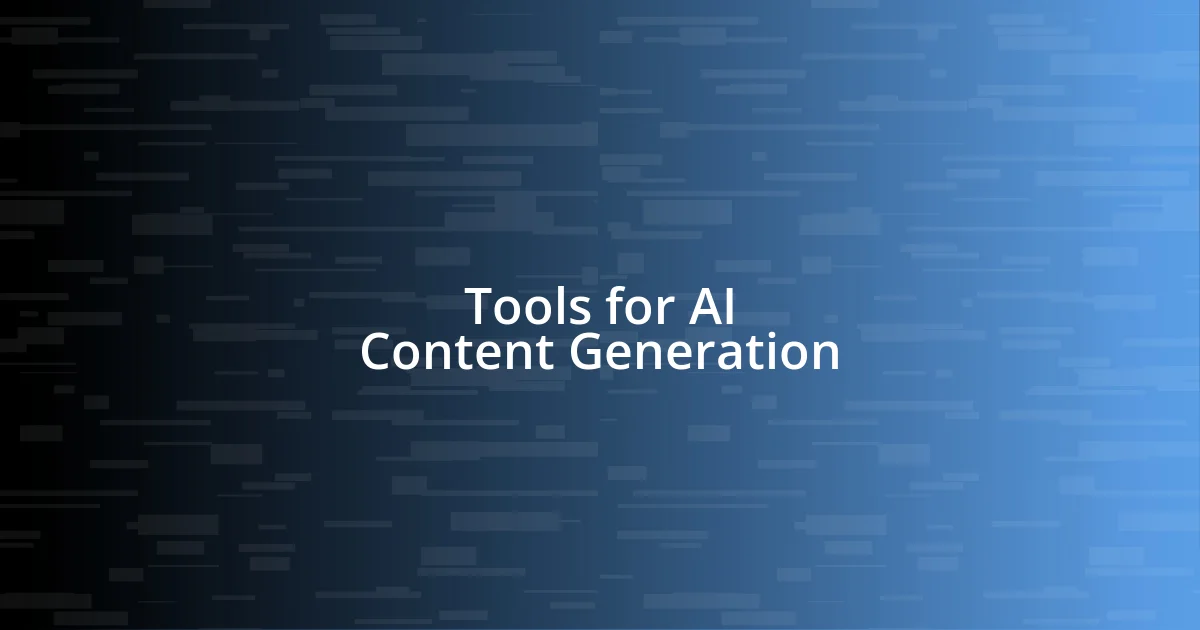
Tools for AI Content Generation
When it comes to AI content generation tools, I’ve experimented with several options, each offering unique features that can enhance my workflow. For instance, I recall a time when I discovered an AI writing assistant that helped me develop structured outlines quickly. This was particularly beneficial for me during high-pressure days when I had multiple deadlines. Suddenly, brainstorming became less daunting, and I felt more organized and focused.
I’ve also recently started using AI tools that specialize in SEO optimization. These platforms analyze trending topics and suggest keywords that could improve my content’s visibility. I remember the thrill of seeing my article perform better in search results just by tweaking a few phrases based on AI suggestions. It’s like having a compass guiding my creativity towards the right audience.
To give an overview of the various tools I’ve encountered, I’ve created a comparison table highlighting their distinct advantages. This really helps in making an informed choice about which tool fits my needs best.
| Tool Name | Main Features |
|---|---|
| Grammarly | Real-time grammar and style checking |
| Jasper | Content generation and brainstorming |
| SurferSEO | SEO optimization and keyword analysis |
| Copy.ai | Multi-purpose copy generation for ads, blogs, etc. |
| WriteSonic | AI-driven content creation for various formats |
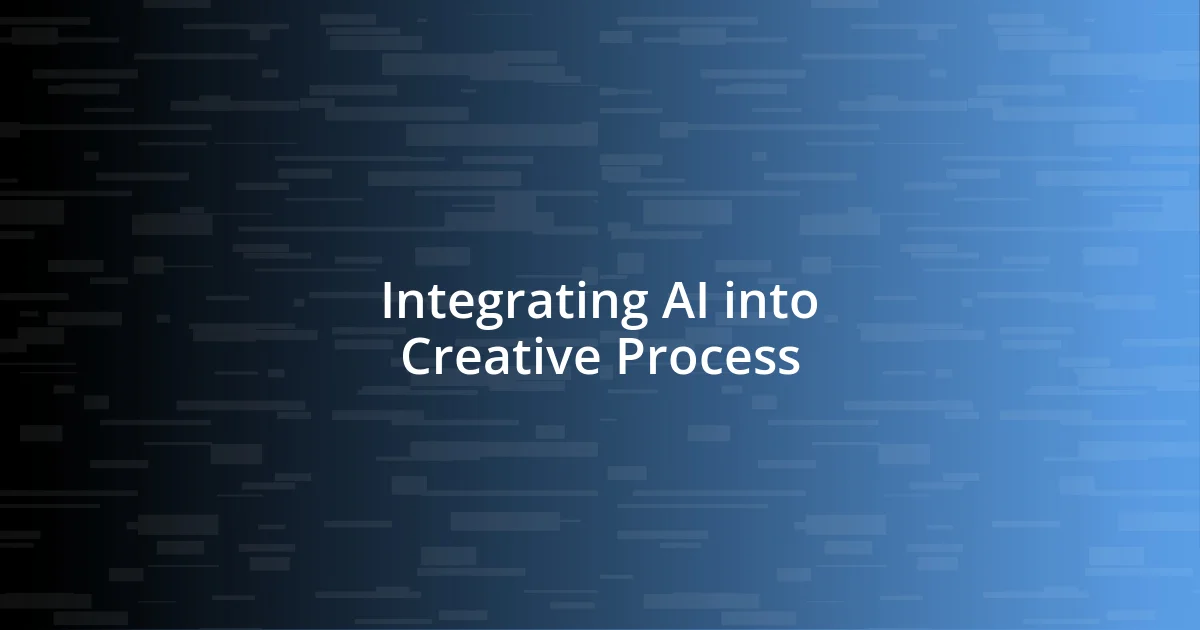
Integrating AI into Creative Process
Integrating AI into my creative process has been a game-changer. I remember the moment I allowed an AI tool to guide my brainstorming sessions. The sheer exhilaration of watching my tangled thoughts transform into structured ideas was eye-opening. It felt like having a brainstorming partner who effortlessly sifted through my chaotic scribbles, turning them into something coherent.
Frequently, I rely on AI for drafting. I can type a few bullet points, hit a button, and watch as it generates a draft that captures my core ideas. This step often sparks a wave of creativity. Have you ever experienced that moment when an unexpected phrase resonates with you? It’s as if the AI presents ideas I couldn’t have conjured myself. This collaboration not only accelerates the writing process but also ignites a deeper exploration of my subject.
Additionally, I’ve noticed that AI allows me to revise with a refreshed perspective. After stepping away from my drafts, returning to them with AI-assisted editing feels like rediscovering a long-lost piece of art. I often ask myself, “What would I want my reader to feel?” AI helps refine that emotional layer. It’s not just about clarity; it’s about crafting an experience for my audience, engaging them on multiple levels while preserving the essence of my voice.
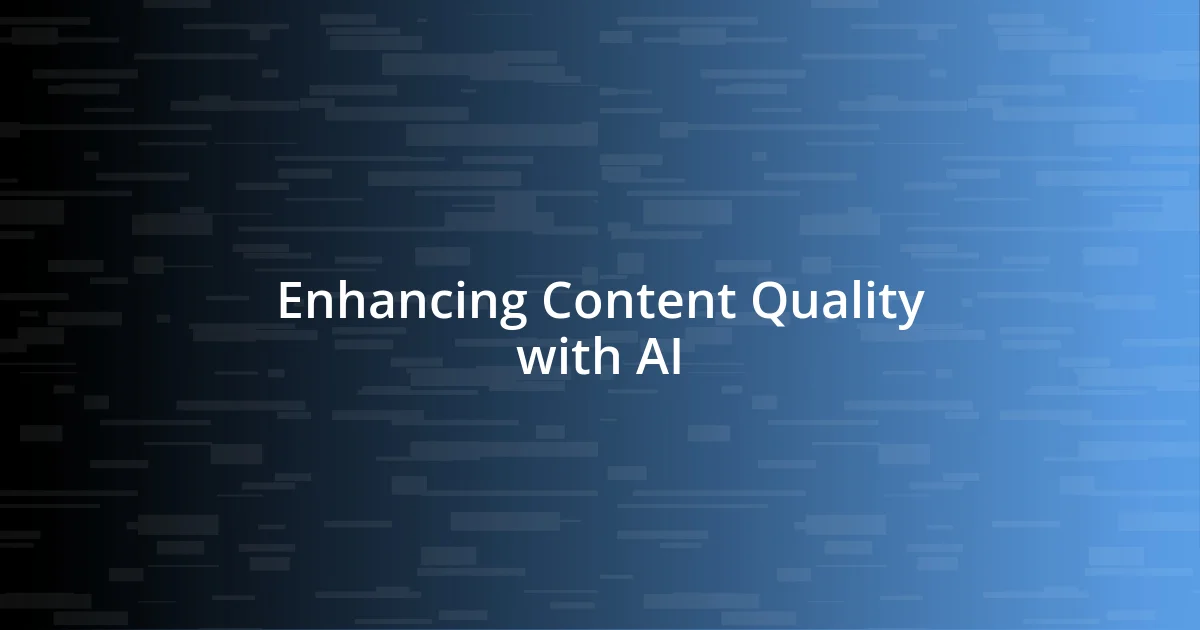
Enhancing Content Quality with AI
AI has truly enhanced the quality of my content in ways I hadn’t initially imagined. Once, while revising an article that felt lackluster, I turned to an AI tool for feedback. The suggestions not only corrected grammar but also provided insight into pacing and clarity—what a revelation! Its recommendations helped me reshape my narrative voice, and I couldn’t help but feel proud when that piece resonated so well with my audience.
There are moments when I wrestle with the right tone or style, and that’s where AI shines. I remember a specific case while working on content for a younger demographic. Instead of guessing what might engage them, I leveraged AI to analyze language trends in popular online platforms. Seeing how well those insights aligned with my own research was invigorating, like rediscovering an old favorite song. It’s fascinating to think how a few tweaks suggested by AI can make my writing vibrant and appealing to my audience.
Incorporating AI also allows me to focus my attention where it’s most needed—on creativity and originality. One day, I had a vague but exciting idea swirling in my mind but struggled to articulate it. With a few prompts, I engaged with an AI tool that helped clarify my thoughts. It was like having a brainstorming buddy, nudging me in just the right direction. After all, isn’t it refreshing to have technology assist us in revealing our own ideas, rather than replace them? That’s a powerful collaboration I cherish in my writing journey.
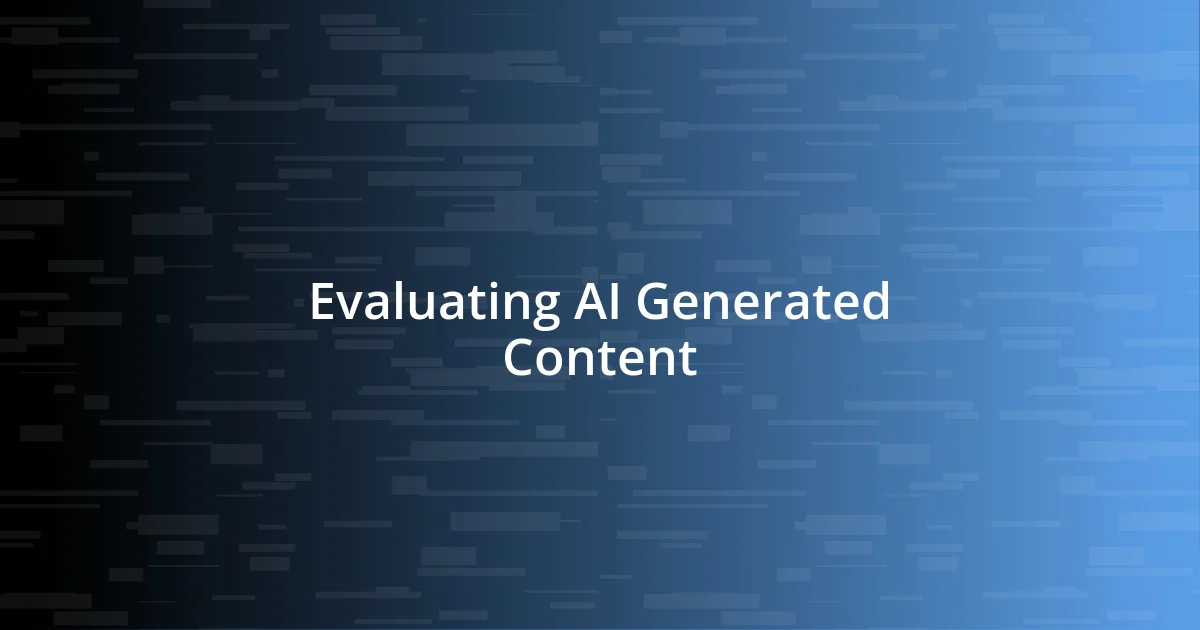
Evaluating AI Generated Content
Evaluating AI-generated content is crucial in ensuring it meets my standards. There’s always that moment of hesitation when reviewing an AI draft. I often ask myself, “Is this really what I wanted to convey?” So, I dive deep into the content, assessing not just the grammar, but also the nuance and voice. It’s fascinating how an AI can mimic styles, but it’s my job to ensure the final output truly resonates with my audience.
Another thing I frequently notice is the subtle disconnect that sometimes occurs between AI text and my intended emotional tone. For instance, I once received a draft that was technically sound but lacked the warmth I love to infuse into my writing. It felt like chatting with a friend who didn’t quite get the joke. In those moments, I’ve learned to put my own stamp on the content, even if that means shifting phrases or adding a personal touch here and there.
I’ve also found that using AI prompts me to be more critically engaged with my material. Often, after reviewing AI-generated suggestions, I find myself asking, “What’s missing?” This reflective process has led to richer, more engaging content. It’s almost like the AI provides a mirror, reflecting not just what I’ve written, but also highlighting ways I can elevate my ideas even further. Embracing this evaluative mindset can make all the difference in transforming decent content into something exceptional.
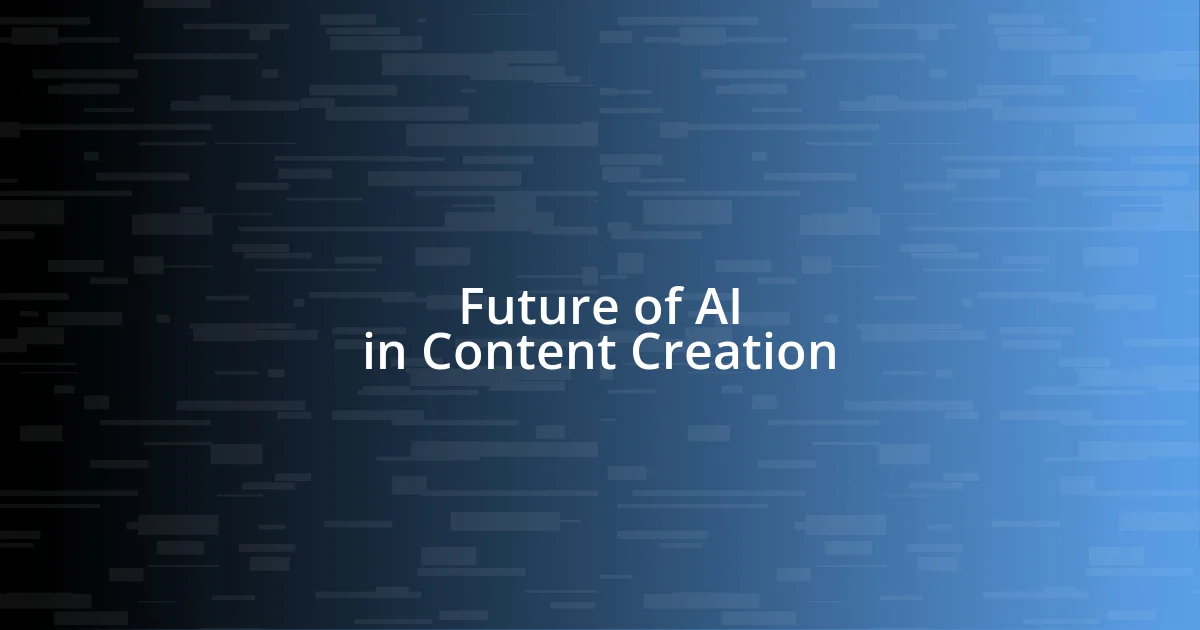
Future of AI in Content Creation
As I look ahead, I can’t help but feel a mix of excitement and curiosity about how AI will shape content creation. I’ve noticed that these tools are becoming smarter, predicting not just the types of content we need but also the style and emotional undertones that will resonate best with different audiences. For instance, when experimenting with new forms of storytelling, I’ve found that AI can suggest unique narrative angles I hadn’t considered, almost like a creative partner pushing me to explore uncharted territories.
I remember a recent conversation with a fellow content creator about the potential of AI to personalize content at an unprecedented scale. Imagine being able to tailor materials not just for different age groups but for individual preferences! With advancements in AI, I envision a future where I can curate experiences that feel intimately connected to each reader. This can transform the way we engage, making content feel less like a one-size-fits-all offering and more like a uniquely crafted experience meant just for you.
The integration of AI tools also raises intriguing ethical questions. Will we lose the human touch that makes our stories relatable? Personally, I believe there’s room for both innovation and authenticity. I’ve made it a point to blend my voice with AI-generated insights, ensuring that every piece I create maintains its humanity. This balance is essential; after all, while AI can enhance our work, it’s the emotional connection we establish with our audience that truly elevates content. How can we strike that balance together? That’s the challenge I eagerly embrace as I navigate the future of content creation.












